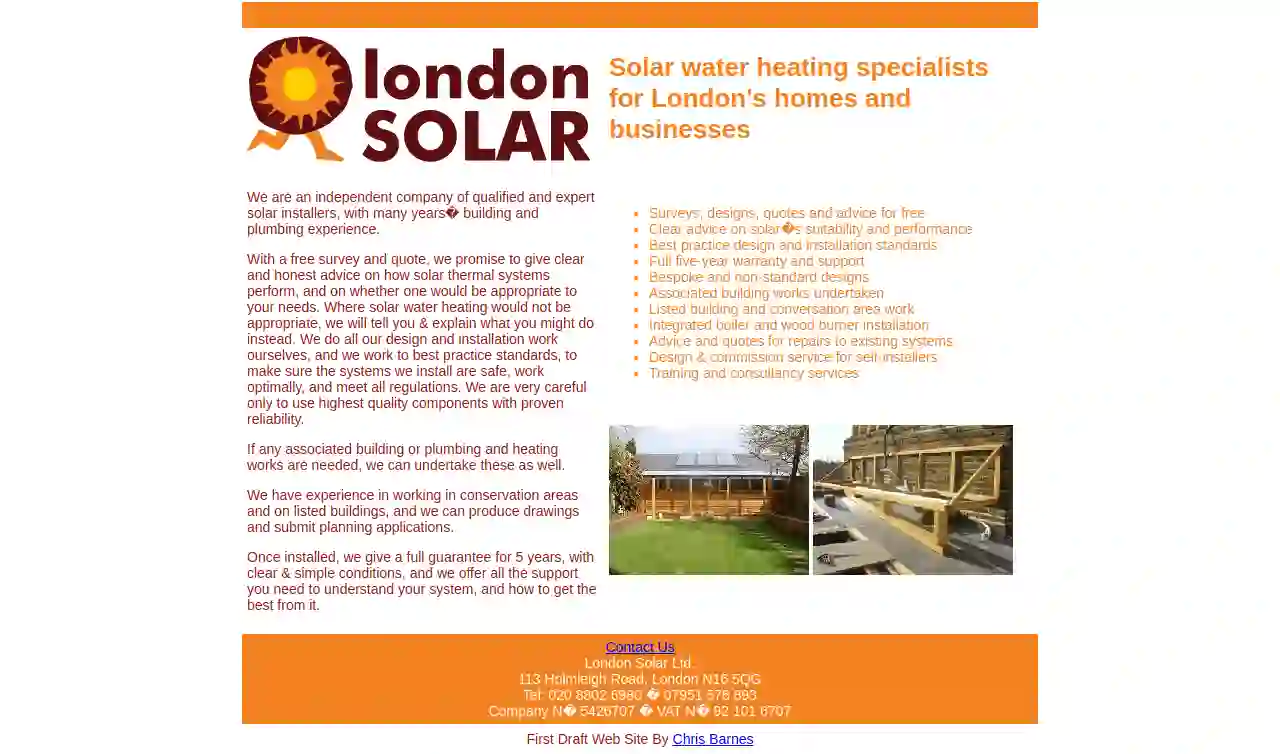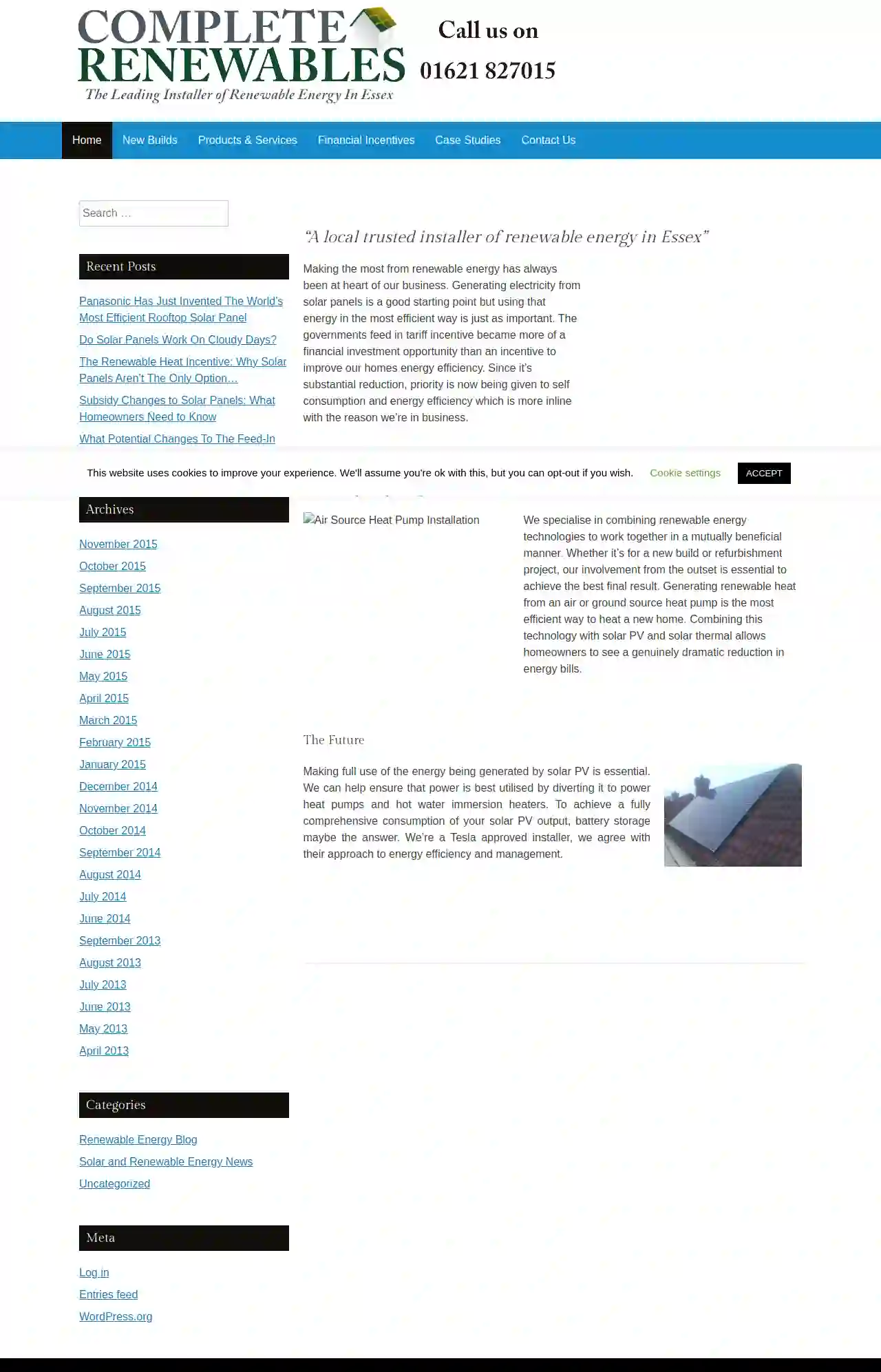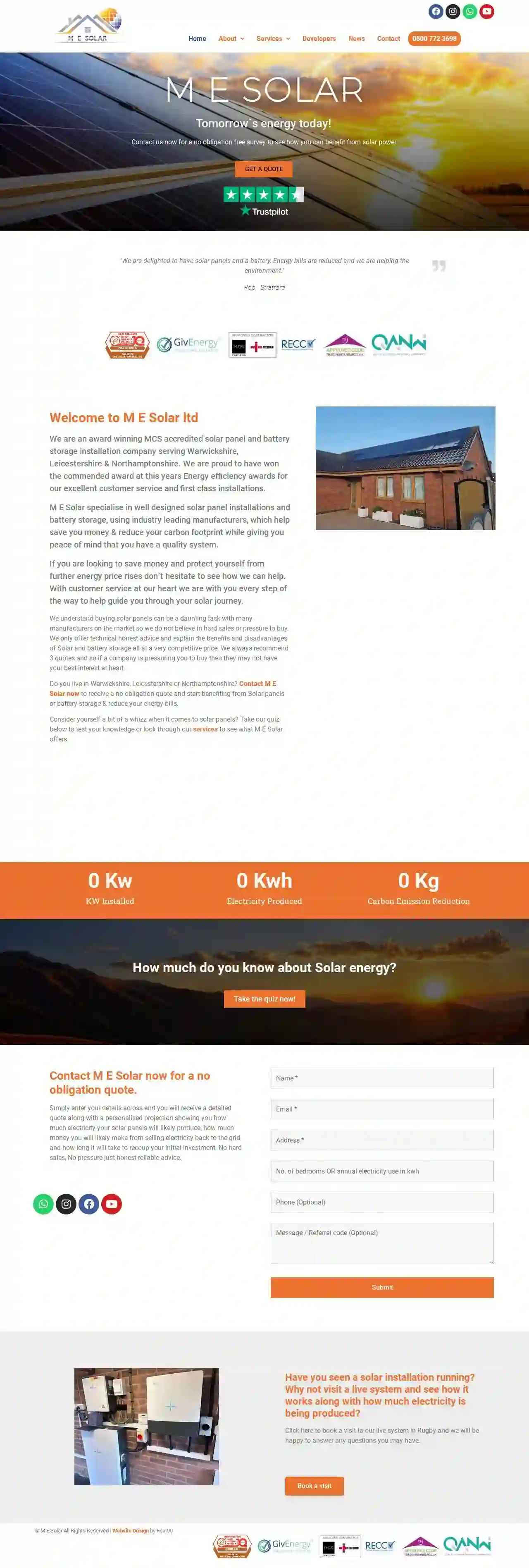Commercial Solar Installers Harrow
Top Commercial Solar Companies in Harrow
Receive up to 3 Commercial Solar Installers quotes for your project today! Compare profiles, reviews, accreditations, portfolio, etc... and choose the best service.

Energy Saving Grants
123 Main Street, Portsmouth, PO1 1AA, GBEnergy Saving Grants is a website that provides information on government grants for energy efficiency. The website is dedicated to helping individuals and businesses save energy and reduce their carbon footprint. With a range of services and products, Energy Saving Grants aims to make energy efficiency accessible to everyone.
- Services
- Why Us?
- Accreditations
- Our Team
- Testimonials
Get Quote
London Solar Limited
113 Holmleigh Road, London, N16 5QG, GBWe are an independent company of qualified and expert solar installers, with many years' building and plumbing experience. With a free survey and quote, we promise to give clear and honest advice on how solar thermal systems perform, and on whether one would be appropriate to your needs. Where solar water heating would not be appropriate, we will tell you & explain what you might do instead. We do all our design and installation work ourselves, and we work to best practice standards, to make sure the systems we install are safe, work optimally, and meet all regulations. We are very careful only to use highest quality components with proven reliability. If any associated building or plumbing and heating works are needed, we can undertake these as well. We have experience in working in conservation areas and on listed buildings, and we can produce drawings and submit planning applications. Once installed, we give a full guarantee for 5 years, with clear & simple conditions, and we offer all the support you need to understand your system, and how to get the best from it.
- Services
- Why Us?
- Gallery
Get Quote
Energevo Renewables
XXXXX, GBSustainable and Reliable Solar Energy Solutions for Your Home or Business. Welcome to Energevo Renewables, a unique group of experienced and talented engineers, specialist installers, financial forecasters and project managers. Our understanding of complex systems and ability to implement these systems successfully is the hallmark of Energevo Renewables. We are a solar installation partner that can help you or your business join the renewables revolution. With the incredible rise in energy bills, there's never been a better time to get solar for your property or business. Join the thousands of people that are benefiting from solar power today.
- Services
- Why Us?
- Accreditations
- Gallery
Get Quote
Glo Renewables
529 reviewsTotnes, Devon, Unit 1, The Old Bakery, TQ9 5LW, GBGlo Renewables is a solar panel and renewable energy solutions provider based in Devon, UK. They offer a range of services including domestic and commercial solar panels, car and EV charging, solar hot water, batteries, and electrical services. The company is committed to helping customers reduce their carbon footprint and save money on energy bills. With a team of experienced professionals, Glo Renewables provides expert advice and installation services to ensure a smooth and stress-free experience for their clients.
- Services
- Why Us?
- Accreditations
- Our Team
- Testimonials
- Gallery
Get Quote
ZOA Energy Solutions
4.596 reviewsQueens Court, 9-17 Eastern Rd, Romford, RM1 3NG, GBZOA Energy Solutions is a company dedicated to helping UK individuals and families save on energy costs and reduce their carbon footprint. We specialize in providing a range of energy-efficient measures, including boiler installations, electric installations, heating controls, insulation, and more. Our team of experienced engineers and energy assessors are committed to delivering exceptional service and helping our clients make informed decisions about their energy needs. We work with local governments to tackle fuel poverty and ensure that everyone has access to affordable and sustainable energy solutions.
- Services
- Why Us?
- Accreditations
- Testimonials
- Gallery
Get Quote
Meel Group - Sustainability Solutions
Meel Group – Sustainability Solutions, Macclesfield, Cheshire, Snape Rd, SK10 2NZ, GBMeel Group - Sustainability Solutions is a company that specializes in installing sustainability solutions for businesses. They offer a range of services including EV charger installation, workplace and fleet charging, residential EV charge point installation, solar panels, heat pumps, and battery solutions. With over 55 years of experience in mechanical, electrical, and heating systems, they have the knowledge and expertise to integrate renewable technology into traditional heating and plumbing systems. They are based in Cheshire and serve the surrounding counties.
- Services
- Why Us?
- Accreditations
- Testimonials
- Gallery
Get Quote
Complete Renewables Ltd.
3.86 reviewsLondon, GBMaking the most from renewable energy has always been at heart of our business. Generating electricity from solar panels is a good starting point but using that energy in the most efficient way is just as important. The governments feed in tariff incentive became more of a financial investment opportunity than an incentive to improve our homes energy efficiency. Since it’s substantial reduction, priority is now being given to self consumption and energy efficiency which is more inline with the reason we’re in business. The Complete package We specialise in combining renewable energy technologies to work together in a mutually beneficial manner. Whether it’s for a new build or refurbishment project, our involvement from the outset is essential to achieve the best final result. Generating renewable heat from an air or ground source heat pump is the most efficient way to heat a new home. Combining this technology with solar PV and solar thermal allows homeowners to see a genuinely dramatic reduction in energy bills. The Future Making full use of the energy being generated by solar PV is essential. We can help ensure that power is best utilised by diverting it to power heat pumps and hot water immersion heaters. To achieve a fully comprehensive consumption of your solar PV output, battery storage maybe the answer. We’re a Tesla approved installer, we agree with their approach to energy efficiency and management.
- Services
- Why Us?
- Gallery
Get Quote
Bliss Eco Energy
518 reviewsLondon, GBSustainable and Renewable Energy Solutions Across The South East of England Energy prices are soaring at an unprecedented rate and we're in the middle of a climate emergency. The need for more sustainable and renewable energy source has never been greater and we at Bliss Eco can provide solutions at competitive prices to homes and businesses across London, Essex and the South East of England. We offer a range of solutions from Solar Panels to utilise natural sunlight, Batteries to store excess power, Heat Pumps and Electric Boilers to sustainably heat water and EV Charging Points for vehicles. If you want to save money on your energy costs and are worried about the environment, Bliss Eco Energy Limited are here to help. Providers of Eco Energy products across London and the South East of England. WE OFFER THE CLEANING AND THE REPAIRING OF SOLAR SYSTEMS TO ANY SOLAR OWNER While we focus on providing a broad range of solar solutions, we also offer cleaning and repair services for existing solar systems. Our goal is to enhance efficiency and extend the lifespan of your installation, ensuring that your solar investment continues to yield high returns. Trust us to keep your system at peak performance. Your name Please enter your name. Your email Please enter a valid email. Your message (Please include phone number) Please enter a message. Send Message Sent! Message failed. Please try again. HAVE OTHER ELECTRICAL NEEDS? Please visit Bliss Electrical for more information and services relating to general electrical needs. www.blisselectrical.com Air ConditioningBlogContactEco Energy Solutions for the South East EnglandEnergy Efficient BoilersEV Charging PointsFINANCE OPTIONSFlat Roof Solar PanelsFlat Roof SolutionsForm TestingFrequently asked questionsHeat PumpsInstallationsMore information on EV ChargersOur ReviewsOur Social MediaSolar PanelsSolar Panels (PV) in Essex – Southend, Castle Point, Brentwood, ColchesterSolar Panels (PV) in Medway – Rochester, Gillingham, Chatham, Rainham, StroodSolar Storage Batteries
- Services
- Why Us?
- Gallery
Get Quote
solaratech
Ark House, 26 Cherry Orchard Road, Bromley, BR2 8NE, GBSolaratech supply and install solar panels, solar energy and car chargers. We are based in Croydon and cover all of London and the South East. If we were able to harness the sunlight that strikes across the earth's surface every 90 minutes, we would have enough energy to power the entire world for a year. Whilst no one would suggest that we try and do that, solar panels on a house, even in the UK, can provide a significant contribution to the household's energy.
- Services
- Why Us?
- Gallery
Get Quote
M E Solar Ltd
52 reviewsHampton, GBM E Solar ltd is an award-winning MCS accredited solar panel and battery storage installation company serving Warwickshire, Leicestershire & Northamptonshire. We are proud to have won the commended award at this year's Energy efficiency awards for our excellent customer service and first class installations. M E Solar specialises in well designed solar panel installations and battery storage, using industry leading manufacturers, which help save you money & reduce your carbon footprint while giving you peace of mind that you have a quality system. If you are looking to save money and protect yourself from further energy price rises don`t hesitate to see how we can help. With customer service at our heart we are with you every step of the way to help guide you through your solar journey. We understand buying solar panels can be a daunting task with many manufacturers on the market so we do not believe in hard sales or pressure to buy. We only offer technical honest advice and explain the benefits and disadvantages of Solar and battery storage all at a very competitive price. We always recommend 3 quotes and so if a company is pressuring you to buy then they may not have your best interest at heart. Do you live in Warwickshire, Leicestershire or Northamptonshire? Contact M E Solar now to receive a no obligation quote and start benefiting from Solar panels or battery storage & reduce your energy bills.
- Services
- Why Us?
- Accreditations
- Our Team
- Testimonials
- Gallery
Get Quote
Over 3,485+ Solar Installers on our directory
Our solar contractors operate in Harrow and beyond!
SolarCompaniesHub has curated and vetted Top Solar Installers arround Harrow. Find the most reliable contractor today.
Frequently Asked Questions About Commercial Solar Installations
- System Cost: The total upfront cost of the system, including panels, inverters, installation, permitting, and other expenses.
- Energy Savings: The estimated annual savings on your electricity bill based on the projected energy production of the system.
- Incentives and Rebates: Include any applicable tax credits, rebates, or other financial incentives that reduce the net cost of the system.
- Depreciation: Factor in the depreciation value of the system over time, which can reduce your tax liability.
- Maintenance Costs: Estimate the annual maintenance costs for your solar system.
- Electricity Rate Inflation: Consider the potential increase in electricity rates over time, which will amplify your energy savings from solar.
- Efficiency: Higher-efficiency panels produce more energy from the same amount of sunlight, but they may have a higher upfront cost.
- Space Availability: If you have limited roof or ground space, higher-efficiency panels allow you to maximize energy production.
- Aesthetics: Consider the visual appearance of the panels and how they integrate with your building or surroundings. Monocrystalline panels tend to have a more sleek and modern look, while polycrystalline panels have a more traditional blue appearance.
- Cost: Polycrystalline panels are generally more budget-friendly, while monocrystalline panels tend to be more expensive.
- Durability and Warranty: All types of solar panels are designed to be durable, but some manufacturers offer longer warranties or better performance guarantees.
How do I calculate the ROI of my commercial solar investment?
What happens to my solar panels if I sell my business?
What is a net metering agreement, and why is it important?
How do I choose the right solar panel type for my business?
How do I calculate the ROI of my commercial solar investment?
- System Cost: The total upfront cost of the system, including panels, inverters, installation, permitting, and other expenses.
- Energy Savings: The estimated annual savings on your electricity bill based on the projected energy production of the system.
- Incentives and Rebates: Include any applicable tax credits, rebates, or other financial incentives that reduce the net cost of the system.
- Depreciation: Factor in the depreciation value of the system over time, which can reduce your tax liability.
- Maintenance Costs: Estimate the annual maintenance costs for your solar system.
- Electricity Rate Inflation: Consider the potential increase in electricity rates over time, which will amplify your energy savings from solar.
What happens to my solar panels if I sell my business?
What is a net metering agreement, and why is it important?
How do I choose the right solar panel type for my business?
- Efficiency: Higher-efficiency panels produce more energy from the same amount of sunlight, but they may have a higher upfront cost.
- Space Availability: If you have limited roof or ground space, higher-efficiency panels allow you to maximize energy production.
- Aesthetics: Consider the visual appearance of the panels and how they integrate with your building or surroundings. Monocrystalline panels tend to have a more sleek and modern look, while polycrystalline panels have a more traditional blue appearance.
- Cost: Polycrystalline panels are generally more budget-friendly, while monocrystalline panels tend to be more expensive.
- Durability and Warranty: All types of solar panels are designed to be durable, but some manufacturers offer longer warranties or better performance guarantees.